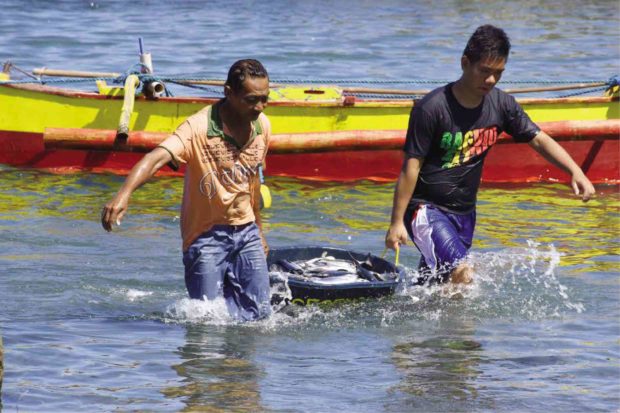
PANATAG BOUNTY In this photo taken in October, fishermen in the coastal village of Cato in Infanta town, Pangasinan province, unload their catch from a fishing trip to the disputed Panatag Shoal in the West Philippine Sea. —WILLIE LOMIBAO
DAGUPAN CITY—Fishermen from Infanta town in Pangasinan province said they were bullied into sharing their catch with members of the Chinese Coast Guard during a fishing trip to the disputed Panatag Shoal in the West Philippine Sea.
Jowe Legaspi, council member of Barangay Cato in Infanta, said fishermen from his village had reported to him that the Chinese boarded their boats and asked for a share of their catch.
“The Chinese would choose the big fish, such as the grouper and ‘maya-maya,’ maybe for their own consumption,” Legaspi told the Inquirer by telephone.
He said the fishermen had no choice but to give in for fear they would again be driven out of the shoal, a rich fishing ground. However, other fishermen said they had been bartering goods with the Chinese and stories of bullying might have risen due to a misunderstanding, said Charlito Maniago, Barangay Cato chief.
“The Chinese would get the fish and in exchange, they would give the fishermen five kilograms of rice, wine, cigarettes or soft drinks,” he said.
For almost four years, Filipino fishermen were barred from the shoal after the Chinese started patrolling the area in 2012.
The shoal, also known as Bajo de Masinloc, is a triangular chain of reefs and rocks surrounding a 150-square-kilometer lagoon. It is about 240 km southwest of Infanta and a traditional fishing ground for fishermen.
Maniago said Filipino fishermen and Chinese patrols appeared to be on good terms.
Two weeks ago, a group of fishermen from Cato took home a speed boat that was sunk by a Chinese patrol, he said. The boat was owned by Chinese fishermen who were caught catching turtles. After their arrest, their boat was sunk.
When they left the area, Infanta fishermen retrieved the boat and towed it to their village, where it is now being used, Maniago said.
“I think the members of the Chinese Coast Guard are more friendly now. I hope it will stay this way forever,” he said.
At least 80 percent of the villagers in Cato are fishermen, most of them engaged in deep sea fishing that takes them at least 100 nautical miles (185 km) away from the shore. —GABRIEL CARDINOZA